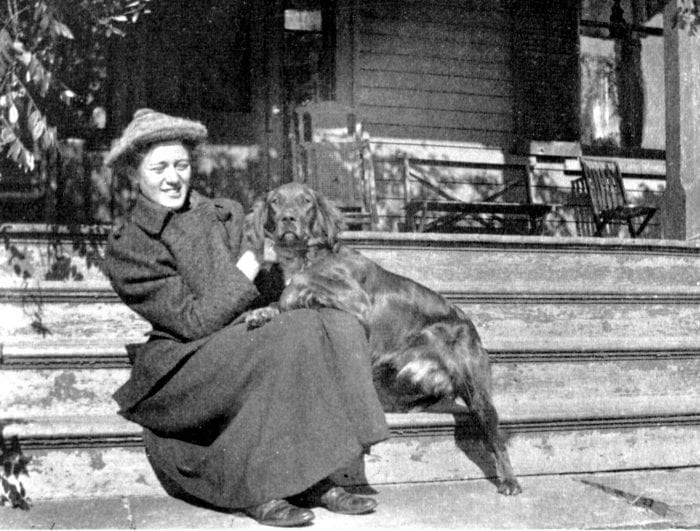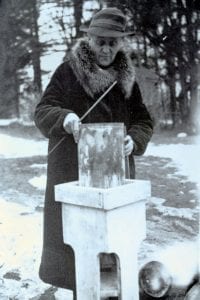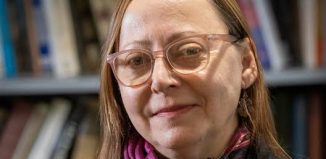Remembering Kate Wheeler Strong, Storytelling Historian

By Beverly C. Tyler
Setauket’s barrier-breaking and storytelling 20th Century Long Island historian Kate Wheeler Strong was born in Setauket March 21, 1879. She was the daughter of Judge Selah Strong and a descendant of Revolutionary War spy Anna Smith Strong, as well as of Setauket settler William “Tangier” Smith. As Dr. Percy Bailey wrote in Oct. 1977, “As a historian, ‘Miss Kate’ has probably done more than any other in popularizing and humanizing the history of this beautiful Long Island which she loved.”

At a time when women were not regarded as serious historians or as community leaders, Kate Strong was able to bring an understanding of local history and storytelling to generations of young people and adults on Long Island. Her influence as a respected writer and local historian for almost four decades cannot be overemphasized, especially this year in light of the 100th anniversary of the ratification and adoption of the 19th amendment to the U.S. Constitution, giving women the right to vote. Strong broke the barriers that got in her way.
Strong wrote local history articles for the Long Island Forum from 1939 through 1976. Most of these articles she published in small booklets which she sold or gave away to friends over the years. These booklets, called “True Tales” have provided a special look into the past for many generations of Three Village residents. Strong died at her home “The Cedars” on Strong’s Neck July 22, 1977. In 1992, William B. Minuse (1908-2002) wrote about Strong in the 1992 Three Village Historian.
“Miss Kate Wheeler Strong was one of the most remarkable persons I have ever known … Miss Kate loved young people. For many years she told stories to groups of children at the Emma S. Clark Memorial Library. When the Stony Brook School opened, she organized a stamp club there.
“Her chief interest over the years was local and family history … She wrote extensively; most of her articles being based on family papers and information gathered from older residents … Even after she lost her sight she persisted. We will always be in her debt for the wonderful anecdotes and the invaluable accounts she left us of our Long Island communities and people. From time to time she gave me artifacts for the Three Village Historical Society. Among them were a pair of snowshoes her father had used during the blizzard of ‘88. Toward the end of her life her neighbors celebrated each of her birthdays, and I was always invited. I shall always remember her most fondly. She was kind and generous.”
After Strong’s death, her personal papers and her family papers going back to her second great-grandfather were donated to the Three Village Historical Society. The Strong collection contains over 3,000 papers of the Strong family of Setauket, dating from 1703 to 1977. Included in the collection are deeds, diaries, 224 handwritten pages of court cases by State Supreme Court Justice Selah Strong, letters about their daily lives, politics, travels, farm matters, business records, school records, payments, receipts, Setauket Presbyterian Church records and weather bureau records. There are approximately 2,250 photographs of families, friends, relatives, places and scenes.
A virtual bench talk with Margo Arceri on Kate Strong is presently featured on the Three Village Historical Society web site www.tvhs.org. Click on the tab Virtual Programming and then on Bench Talks The conversation takes place in the St. George’s Manor Cemetery on Strong’s Neck.

The Three Village area is not only fortunate to have such a long and varied history but to have so many stories that bring the past to life. In this current climate of protest over the treatment of African Americans, both as slaves and as second-class citizens for almost 400 years, it is important to realize that women have also been treated as second-class citizens in America for virtually the same time period. Women received the right to vote in America following the passage of the 19th amendment to the United States Constitution which was passed by Congress June 4, 1919; ratified August 18, 1920; and its adoption certified on August 26, 1920. We are now only two weeks away from the 100th anniversary of the adoption of the 19th amendment.
The National Constitution Center in Philadelphia, Pennsylvania reopened to visitors Wednesday, Aug. 5, 2020, with free admission through Sept. 5, 2020. Timed tickets for entry are required. They will be welcoming visitors Wednesdays through Saturdays from 10 a.m. to 3 p.m. Opening Aug. 26, the center’s newest exhibit, “The 19th Amendment: How Women Won The Vote,” will be included with entry.
“The Three Village Historian: Journal of the Three Village Historical Society,” issue of 1992 includes nine of Kate Wheeler Strong’s “True Tales,” and a complete listing of the 38 years of “True Tales” booklets she produced between 1940 and 1976. This 24-page publication is available at the Three Village Historical Society History Center and Gift Shop, 93 North Country Road, Setauket. However, the gift shop is currently closed. A copy of the 1992 “The Three Village Historian” is in the Long Island Collection of the Emma S. Clark Memorial Library in Setauket, along with a complete set of Kate Strong’s “True Tales.”
Beverly C. Tyler is a Three Village Historical Society historian and author of books available from the society at 93 North Country Road, Setauket. For more information, call 631-751-3730 or visit www.tvhs.org.






